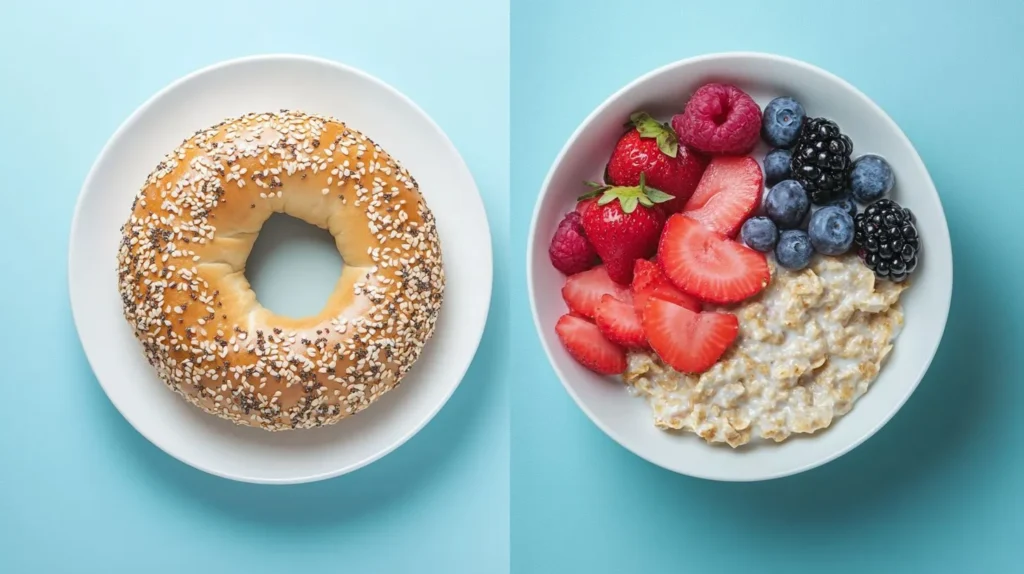Are bagels healthy? It’s a question many of us have pondered as we bite into those chewy, golden rings of bread that have become a beloved breakfast staple worldwide. Bagels are versatile, satisfying, and available in countless flavors and styles, but what’s the real story behind their nutritional value?
Originally from Eastern Europe, bagels have journeyed across the globe to become a popular choice for breakfast, lunch, and even snacks. Whether you enjoy a classic plain bagel or prefer a trendy everything bagel, their appeal is undeniable. But despite their delicious reputation, some wonder if they’re just another carb-heavy indulgence that doesn’t do much for our health.
The truth is, bagels can be both a satisfying treat and a smart part of your diet—depending on how they’re made and what you pair them with. Whole-grain varieties can provide fiber and nutrients, while refined flour versions may lack those benefits. Add in toppings like cream cheese or sugary spreads, and their calorie count can skyrocket.
Curious to know more? 🥯 Let’s dig deeper into the world of bagels and uncover whether they deserve a spot in your balanced diet or should be enjoyed in moderation.
The History and Origin of Bagels
Did you know that bagels have been around for centuries? They originated in Eastern Europe, specifically among Jewish communities in Poland, around the 17th century. Back then, they were boiled and baked to create their distinct chewy texture. Fast forward to today, and bagels are a global phenomenon found in bakeries, cafes, and breakfast menus worldwide.
The Popularity of Bagels Around the World
Bagels have transcended their humble beginnings. In the U.S., New York bagels are legendary, boasting a perfect balance of chewiness and flavor. In Canada, Montreal bagels have their own fan base, known for being sweeter and denser. Everywhere you look, bagels have their unique spin. But the big question remains: are they good for your health?
Nutritional Profile of Bagels
To answer that, let’s first break down what’s inside a bagel. Nutrition is key, so understanding the components of a bagel helps us determine its health benefits—or drawbacks.
Calories and Nutrients in Bagels: Are They a Healthy Choice?
A standard plain bagel (about 100g) typically contains around 250-300 calories. Seems hefty, right? But that’s just the base. Add cream cheese, butter, or sugary toppings, and the calorie count can skyrocket.
Carbs, Fats, and Protein in Bagels
Bagels are primarily made of refined flour, meaning they’re packed with carbohydrates. A plain bagel usually has around 50-60 grams of carbs. They’re low in fat, with about 1-2 grams, and provide roughly 9-10 grams of protein. That balance makes them filling but also carb-heavy.
Vitamins and Minerals Found in Bagels
While bagels aren’t exactly superfoods, they do contain small amounts of essential nutrients like iron, B vitamins, and folic acid. If made with whole grains, they can also provide fiber, which is essential for digestion.
Bagels can fit into various dietary patterns, provided portion sizes are managed. For a gluten-free twist, try these easy gluten-free recipes.
“A bagel is like a blank canvas—its healthiness depends on what you make of it.”
Are Bagels Healthy? Breaking Down the Debate
Now, let’s get into the nitty-gritty. Are bagels actually healthy? Well, it depends. While they have some benefits, they also come with potential downsides.
The Pros of Including Bagels in Your Diet
- Bagels are filling, thanks to their high carb content, making them a great option for active individuals who need energy.
- They’re versatile and can be paired with nutritious toppings like avocado, smoked salmon, or hummus.
- Whole-grain varieties offer fiber, which supports digestive health and helps keep you full longer.
The Cons: Why Bagels May Not Be Ideal for Everyone
- Refined flour bagels can cause blood sugar spikes and crashes, which aren’t great for sustained energy.
- Their high calorie count can be problematic if you’re watching your weight or portion sizes.
- Many bagels lack fiber unless made from whole grains, which can leave you feeling hungry soon after eating.
How Portion Size Impacts Health Benefits
Let’s be honest: it’s easy to devour a bagel in one sitting. But portion control is key. Splitting your bagel or opting for smaller varieties can help manage calorie and carb intake while still enjoying this tasty treat.
Common Health Concerns About Bagels
Bagels might seem harmless, but they’re not without their critics. Let’s address some of the most common concerns people have.
Are Bagels Bad for Weight Loss?
If you’re trying to lose weight, bagels can be tricky. Their high calorie and carb content might not fit into a low-calorie diet. However, swapping a plain bagel for a whole-grain or smaller option can help you enjoy them without derailing your goals.
The Impact of Refined Flour on Health
Refined flour, a common ingredient in most bagels, lacks the fiber and nutrients found in whole grains. This can lead to quick energy spikes followed by crashes, leaving you hungry again in no time. Whole-grain bagels are a smarter choice.
Gluten and Bagels: What You Need to Know
If you’re gluten-sensitive or have celiac disease, traditional bagels are a no-go. But don’t worry—gluten-free alternatives are widely available and just as delicious!
| Nutrition Facts (Plain Bagel) | Quantity per 100g |
|---|---|
| Calories | 260 |
| Carbohydrates | 54g |
| Protein | 9g |
| Fat | 1.5g |
| Fiber | 2g |
Healthier Bagel Options and Alternatives
Not all bagels are created equal. If you love bagels but want a healthier option, consider these alternatives.
Whole Grain Bagels: A Better Choice?
Whole grain bagels are a game-changer. They’re richer in fiber, which helps stabilize blood sugar levels and keeps you feeling full longer. Plus, they taste great with savory toppings like avocado or cream cheese.
Low-Calorie Bagel Varieties
Many bakeries and brands now offer “skinny” or low-calorie bagels, which are smaller in size or made with alternative flours to reduce calories. These are perfect if you’re looking for a lighter option without sacrificing flavor.
Gluten-Free Bagel Alternatives
For those avoiding gluten, gluten-free bagels made from almond flour, rice flour, or chickpea flour are widely available. They’re just as satisfying and come in various flavors to suit your taste.
If you’re interested in creating quick and simple alternatives, check out this guide to 2-ingredient bagels.
Tips for Making Bagels Healthier
Bagels can absolutely be part of a healthy diet with a few simple adjustments. Instead of seeing them as a guilty pleasure, think of them as a canvas for nutritious additions. Opt for whole-grain or smaller-sized bagels to boost fiber and reduce calorie intake. Pair them with protein-rich toppings like eggs, smoked salmon, or nut butter to balance the carbs and keep you full longer. Add a serving of fresh veggies like spinach, tomatoes, or cucumbers for extra vitamins and crunch. Choosing healthier spreads, such as avocado or hummus, over sugary or high-fat options can make all the difference. With these tweaks, you can enjoy your favorite bagels without straying from your health goals!
For those interested in experimenting with healthier comfort foods, learn about recipes like smoked mac and cheese for a balanced indulgence.
Choosing the Right Toppings
What you put on your bagel can make or break its nutritional value. Instead of loading up on sugary spreads or heaps of cream cheese, try healthier alternatives like:
- Avocado: Rich in healthy fats and adds a creamy texture. 🥑
- Hummus: A protein-packed, flavorful spread.
- Nut butter: Adds protein and healthy fats, but watch the portion size.
- Greek yogurt: A creamy, tangy alternative to cream cheese.
Pairing Bagels with Protein-Rich Foods
A plain bagel is primarily carbs, so balance it out with protein to keep your energy levels steady. Pair your bagel with eggs, smoked salmon, or lean turkey for a more satisfying meal. Ever tried a bagel sandwich? It’s a game-changer! 🥪
Incorporating Veggies into Your Bagel Meal
Adding veggies to your bagel meal not only boosts flavor but also increases its nutritional value. Think spinach, tomatoes, cucumbers, or even roasted veggies. They add crunch, vitamins, and a pop of color to your plate.
Recipes for Healthy Bagels at Home

Why not try making your own bagels at home? Homemade bagels allow you to control the ingredients and customize them to your preferences. Here are two recipes to get you started.
How to Make Whole Wheat Bagels
Ingredients:
- 2 cups whole wheat flour
- 1 packet (7g) active dry yeast
- 1 teaspoon salt
- 1 tablespoon honey
- 3/4 cup warm water
Instructions:
- Mix flour, yeast, and salt in a bowl.
- Add honey and warm water, then knead the dough until smooth.
- Let the dough rise for 1 hour.
- Shape into bagels, boil for 1 minute on each side, and bake at 375°F (190°C) for 20 minutes.
Low-Carb Bagel Recipe
Ingredients:
- 2 cups almond flour
- 1 tablespoon baking powder
- 2 cups shredded mozzarella
- 2 ounces cream cheese
- 2 large eggs
Instructions:
- Melt mozzarella and cream cheese together until smooth.
- Mix with almond flour, baking powder, and eggs to form a dough.
- Shape into bagels and bake at 400°F (200°C) for 12-15 minutes.
Comparing Bagels with Other Breakfast Options

Ever wondered how bagels stack up against other breakfast choices? Let’s compare them to some popular options.
Bagels vs. Bread: Which Is Healthier?
Bagels have more calories and carbs than a slice of bread. However, they’re also more filling, making them a better choice if you’re looking for a hearty breakfast. The key is moderation and choosing whole-grain varieties.
Bagels vs. Oatmeal: A Nutritional Perspective
Oatmeal wins in terms of fiber and slow-releasing energy, but bagels offer versatility. If you’re craving variety, a whole-grain bagel with healthy toppings can be just as satisfying as a bowl of oats.
“Think of breakfast as the fuel for your day—choose wisely and enjoy the ride. 🚴”
Frequently Asked Questions About Are Bagels Healthy?
Let’s tackle some burning questions about bagels and health.
Are Bagels Suitable for Diabetics?
Bagels can cause blood sugar spikes due to their high carb content, making them a tricky choice for diabetics. Opting for whole-grain, low-carb, or smaller bagels can help manage this. Always consult your doctor or dietitian for personalized advice.
How Often Should You Eat Bagels?
Bagels are best enjoyed in moderation. Eating them daily might not be ideal, especially if they’re made with refined flour. Treat them as an occasional indulgence or balance them out with other nutrient-rich meals.
Can Bagels Be Part of a Balanced Diet?
Absolutely! Bagels can fit into a balanced diet if you make mindful choices. Choose whole-grain versions, control portion sizes, and add nutrient-dense toppings to create a meal that satisfies both your taste buds and your nutritional needs.
Are Bagels Better Toasted or Untoasted?
It depends on your preference! Toasting a bagel enhances its texture, giving it a crispy outer layer while keeping the inside warm and chewy. It’s perfect if you’re adding toppings like butter, cream cheese, or avocado, as the warmth melts them slightly, creating a deliciously satisfying bite. On the other hand, fresh, untoasted bagels are soft, fluffy, and ideal if you enjoy the natural chewiness without added crunch. Some bagel purists argue that fresh, high-quality bagels don’t need toasting. The choice is yours—experiment with both and decide what suits your taste buds best!
Final Thoughts: Are Bagels Healthy for You?
Key Takeaways from the Nutritional Analysis
Are bagels healthy? The answer isn’t simple—it depends on the type of bagel you choose, how much you eat, and what you pair it with. Bagels are a versatile and delicious food that can fit into a balanced diet if approached thoughtfully.
On the positive side, bagels are filling and provide a good source of energy, especially for active individuals. Whole-grain bagels offer fiber and essential nutrients, making them a healthier option compared to those made with refined flour. Plus, they’re a blank canvas for nutritious toppings like avocado, smoked salmon, hummus, or fresh veggies, which can boost their nutritional profile significantly.
However, it’s important to be mindful of their downsides. Traditional bagels, often made with refined flour, can lead to quick spikes in blood sugar and may lack fiber, leaving you feeling hungry soon after eating. Their high calorie and carbohydrate content might also be a concern for those watching their weight or managing blood sugar levels.
The key to enjoying bagels healthily lies in balance. Opt for smaller portion sizes or whole-grain varieties, and top them with protein-rich and nutrient-dense ingredients. Treat bagels as an occasional indulgence rather than a daily staple, and remember, moderation is everything.
At the end of the day, bagels can be part of a balanced diet if you make smart choices. Life is about enjoying your favorite foods while maintaining a healthy lifestyle—so grab a bagel and enjoy it guilt-free!

